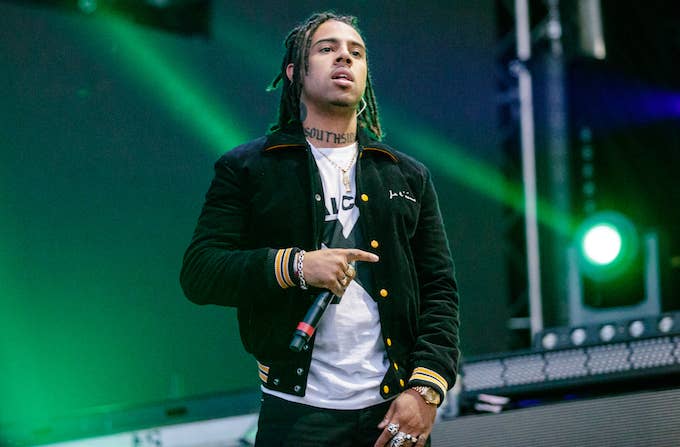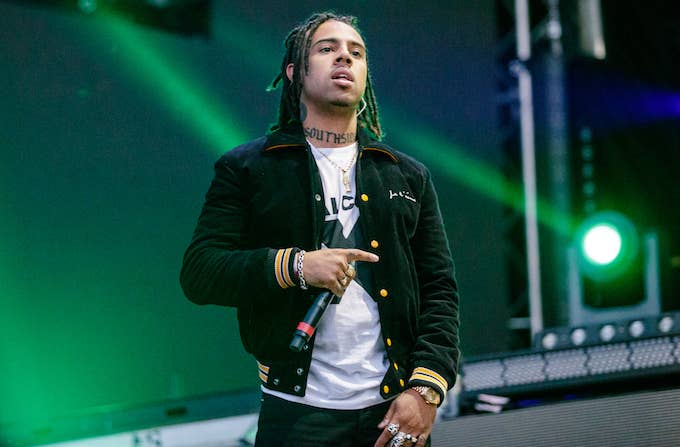
In 2009, the world met Vic Mensa. As the frontman for the Chicago rock band Kids These Days, he and his high school friends quickly became indie darlings. The release of their 2012 album, Traphouse Rock was supposed to be the beginning of their ascension as a younger version of the Roots. But in May 2013, the group disbanded. Members from Kids These Days, including Nico Segal, Greg Landfair Jr., Liam Cunningham, Lane Beckstrom, J.P. Floyd went on to work with another rising Chicago artist, Chance the Rapper.
Vic Mensa’s solo career began in earnest with 2013’s critically acclaimed mixtape Innanetape. The success of the project led to a Roc Nation signing and a Roc-a-Fella logo tatted on Vic’s neck. In 2014, he was named a member of the XXL Freshman Class and released the biggest song of his career thus far with the house song “Down On My Luck.” Vic was morphing into the type of ascendant star J.Cole—another Roc Nation signee—had been before him. However, Vic’s tendency to constantly experiment with both his music and persona got the best of him.
The Kanye West featuring “U Mad” saw Mensa trying a post-Yeezus aesthetic, rock star memorabilia and all. His soft and lilting tenor showed up on The Life of Pablo song, “Wolves” only to be famously removed and reattached after a well timed “Ima fix Wolves” tweet from Kanye himself. Mensa released the politically charged EP, There’s Alot Going On in 2016 during a tumultuous summer fraught with police killings of innocent blacks and the ongoing Flint water crisis. Despite the spirited way Vic rapped about these issues, the music didn’t connect.
The story of The Autobiography, his proper full-length debut, is inextricable from Mensa’s bout with drug addiction, suicidal thoughts, mental illness, infidelity, and the onslaught of death that surrounded him. In conversation, Vic is strategic. Even over the phone his assuredness can be felt in his deliberate manner of speaking. He raps that way too. There is little room for interpretation with Mensa. He means what he says.
The following interview has been edited for clarity and length.
The black community rarely talks about mental health issues, thoughts of suicide, and battling addiction. What did it mean to you to be so open about your story on this album?
First and foremost, writing about my struggles with mental health and drug dependence is confessional and healing for me. While on the other side of the same token it's been an honor for me to be able to lend my own experiences to the situations of others. I’ve just gotten a lot of strong feedback from people ever since I really started opening up very candidly about these things in my life. Telling me that my music saved their life or got them through tough times. So I think that being from a community, in which mental health issues are so stigmatized that it's important to open up channels to that conversation. Because everybody heard it and dealing with things in their own way. A lot of it is self medication. I feel like that's just the top layer of this pain. The community is very open in rap and music about the drugs that are very much apart of the lifestyle, but not so much open about what’s underneath drug use.
When did the transition from calling the album Traffic to The Autobiography occur?
It’s just a completely different album. Traffic was an album that had a significant amount of songs. It was not complete and I felt didn’t fully represent me as a person or as the artist I want to be and so when I started the writing process for The Autobiography I was really turning a corner in my life. Traffic, it was difficult for me to express a lot of the things I was feeling, because I was so deep in the thick of them.
What did No I.D. bring to this project?
No I.D. was one of my biggest inspirations before I ever met him. I’ve been a huge fan of No I.D. since I was 12 years old, off the back of Resurrection, Can I Borrow a Dollar?, and One Day It Will All Make Sense. Common’s albums from the early ’90s that were some of my biggest influences when I picked up a pen and started to write my own rhymes. So being able to work with him on the album was a real learning experience. We have a funny running joke about me trying to figure out his style. No I.D. is like an alchemist and he’ll only give you so much at one time. It’s for the best at the end of the day, cause through the process of working with No I.D. I was able to soak up his perspective for songwriting and production and keeping music alive.
Did Jay-Z impart any type of wisdom upon you during the making of this album? What did he bring to the album?
Hov was very essential in helping me to keep my storyline concise and the arc even. He heard all of the music as it was in the process of being written and produced. His feedback and different directions inspired me in different ways. Then, as we neared the end of the album process, he specifically listened to me, how much he liked that I kept my head down in this process as a grio of sorts. Opposed to picking my head up being a rapper. That I spoke from more of an observational narrative standpoint, than from a traditional, boastful rap standpoint. It’s not something I had thought about that much, because I was just writing. I was within this concept, but I didn’t really realize I rarely stepped out of the room and these thoughts. And when he gave me that piece of feedback I changed a couple things to
"I stopped doing drugs. I started taking my mental health seriously."
make sure I really stayed inside of these scenarios. He was also just important to me looking past some young temptations of conflict and lyrical jabs.
On “Heaven on Earth” you talk about the death of your friend Cam. What did he mean to you?
One of the reasons Cam was so important to me is because, in this music and culture of hip-hop that I’ve come to make a career and a way of life out of, he was the first person to reach out and take me under his wing, point blank. That was when I was 12, maybe 13 years old, doing graffiti in the neighborhood. And he reached out to me and asked me if I wanted be down with Jam crew—a graffiti crew from the Southside. Keep in mind that there are not a lot of, if any, other graffiti crews that were active on the Southside of Chicago in the black community. Just that vote of confidence, it did a lot for me. I ultimately would come to make a full existence out of this hip-hop thing.
What gave you the idea to approach the second verse of “Heaven on Earth” from Cam’s perspective and the third verse from the perspective of his killer? Was that hard for you?
No, it wasn’t hard coming from the perspective of the killer. I guess afterwards it was pretty heavy listening back to it. But to put myself in that person’s shoes was pretty liberating, because it took the weight of hatred off my shoulders.
On that song and throughout the album you talk about a darkness like wanting to commit suicide, having a gun in your mouth...what led you to that point of desperation?
It was a dark place. I was in a vicious cycle of drug dependence and dissatisfaction with the music I was making, the things I was saying in the music I was making. I had like pretty much depleted my brain of all chemicals that bring you...dopamine and the serotonin. It was just a perfect storm that led me to a pretty dark place.
What got you out of that?
I was lucky enough to have a woman in my life that I’m in a relationship with who was able to look past the pain I caused her from a hurt place to help me to get better. I stopped doing drugs. I started taking my mental health seriously, really working with a therapist and a psychiatrist.
You mention Joey Purp, Kene, Smoko, Towkio multiple times throughout the album. What type of positive impact did your friends have on you during the making of this album?
Honestly, Towkio’s album World Wide .Wav, seeing the way that they were in major creative zone at Shangri La [Rick Rubin’s studio, outside of Los Angeles] and the music he was making really inspired me to get on my shit. I think we push each other to just be dope, to be fresh, try to keep it interesting.
How has your attitude towards beef changed? Obviously, in every interview people will bring up friendships like Chance the Rapper. Hip-hop is a competitive sport, but has your attitude to beef changed during this process?
By nature I can be a confrontational person. I don’t feel like there’s anything wrong with that. As far as putting that in the music sometimes, it can detract from the bigger purpose, the purpose and power that is within the music.
How did it feel recording a song like “The Fire Next Time” and getting to speak directly to your redemption and coming out the other side of this very dark time in your life?
Recording that song was really dope. It was one of the last songs I recorded on the album. I found it to be very cathartic, but also it was a good place to be at, because I could look at and point at places I had taken the narrative and speak to how I learned from those things. I’ve already written songs like “Heaven On Earth,” “Homewrecker,” and “Wings” so when I’m talking about, “You can see the pain still alive in my eyes/I've loved and I've lost, through heaven and hell/Turn they back on me,” it’s like I’ve already depicted these situations, which made it like I almost had a bird’s eye view.

